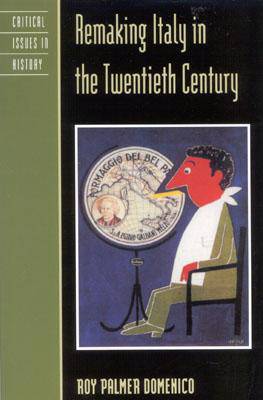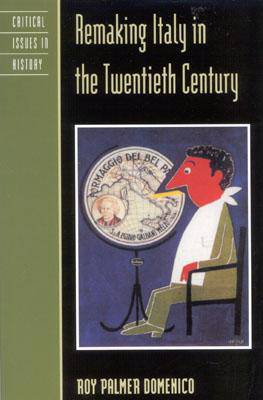
- Afhalen na 1 uur in een winkel met voorraad
- Gratis thuislevering in België vanaf € 30
- Ruim aanbod met 7 miljoen producten
- Afhalen na 1 uur in een winkel met voorraad
- Gratis thuislevering in België vanaf € 30
- Ruim aanbod met 7 miljoen producten
Zoeken
Omschrijving
Although the unification of Italy in 1870 initially defined the nation's geographic boundaries, Italians faced the new challenge of determining their nation's social, political, and cultural identity as they entered the twentieth century. In Remaking Italy in the Twentieth Century, noted scholar Roy P. Domenico examines the struggle between Liberals, Fascists, Marxists, and Catholics to recast the nation according to their visions. As he focuses on Italy's political course, Domenico deftly highlights the economic, social, and cultural changes that accompanied the shifts in governmental power. In describing those who shaped modern Italy, Domenico reveals how an agricultural society--divided by region, language, and culture--was transformed into a modern state, still faced with regional tension, ethnic division, and the problems inherent in post-modern society. Straightforward and succinct, Remaking Italy in the Twentieth Century will be of great value to all interested in Italian history and culture.
Specificaties
Betrokkenen
- Auteur(s):
- Uitgeverij:
Inhoud
- Aantal bladzijden:
- 200
- Taal:
- Engels
- Reeks:
Eigenschappen
- Productcode (EAN):
- 9780847696376
- Verschijningsdatum:
- 13/11/2002
- Uitvoering:
- Paperback
- Formaat:
- Trade paperback (VS)
- Afmetingen:
- 150 mm x 227 mm
- Gewicht:
- 294 g

Alleen bij Standaard Boekhandel
+ 78 punten op je klantenkaart van Standaard Boekhandel
Beoordelingen
We publiceren alleen reviews die voldoen aan de voorwaarden voor reviews. Bekijk onze voorwaarden voor reviews.











